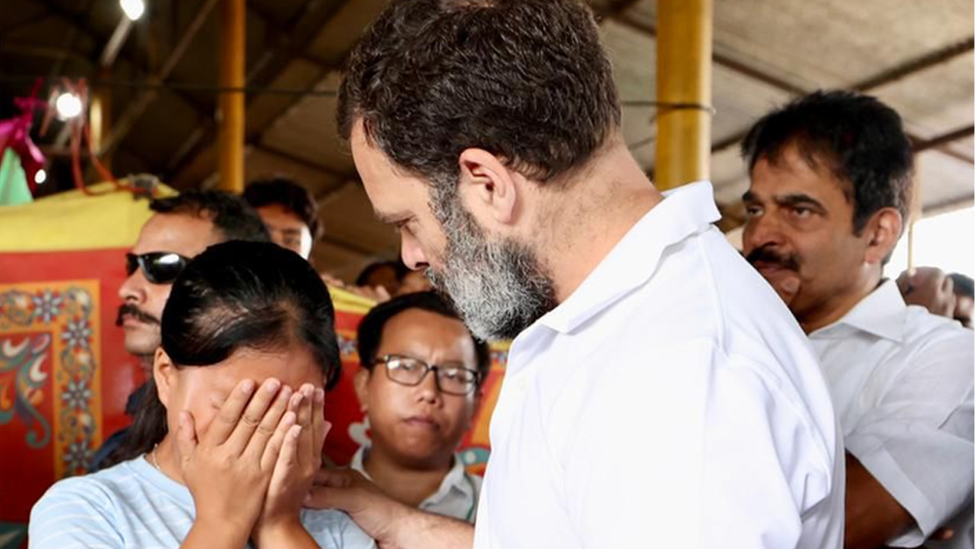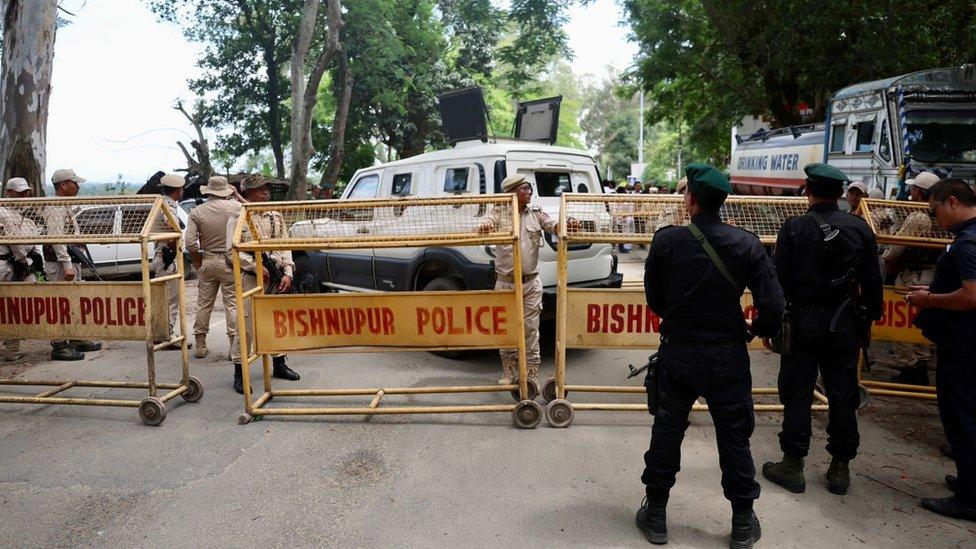Rahul Gandhi: Congress leader meets victims of violence in Manipur
- Published

Rahul Gandhi met some of those who'd fled to find safety in relief camps
India's opposition leader Rahul Gandhi has met people affected by the violence that has engulfed the north-eastern state of Manipur.
On Friday, the Congress leader visited relief camps in Moirang town and met displaced families, the party said.
Mr Gandhi, who is on a two-day trip to the state, also visited a relief camp in Churachandpur district on Thursday.
He travelled there by helicopter after his convoy was stopped by the police, who cited security concerns.
Mr Gandhi is scheduled to meet leaders, external of civil society groups on Friday in the state capital, Imphal.
For the past two months, Manipur has been convulsed by clashes between the majority Meitei and Kuki communities.
More than 100 people have been killed and 400 wounded in the violence. Tens of thousands have fled their homes.
Clashes broke out after the state's main ethnic group, the Meiteis, demanded tribal status which gives access to benefits such as forest land and government job and education quotas.
Prime Minister Narendra Modi has met top government officials to review the situation in Manipur but he has been criticised, external for not visiting the state or commenting on the situation there.
Almost a month after violence began,, external Home Minister Amit Shah visited the state to put in place a plan to restore normalcy, but fresh incidents of violence continue to be reported almost daily.
After arriving in Imphal on Thursday morning, Mr Gandhi shared a Facebook post, external saying that "restoration of peace is the top priority. Manipur needs healing, and only together we can bring harmony".
But soon after, senior Congress leader KC Venugopal told, external reporters that Mr Gandhi's convoy had been stopped by police near Bishnupur district while he was on his way to Churachandpur town to visit relief camps.
"Police say that they are not in a position to allow us. People are standing on both sides of the road to wave to Rahul Gandhi. We are not able to understand why have they stopped us?" Mr Venugopal said.
Police said the convoy had been stopped for Mr Gandhi's security. "Seeing the ground situation, we stopped him from moving forward and advised him to travel to Churachandpur via a helicopter," Heisnam Balram Singh, a senior Bishnupur police official, told ANI, external news agency.

Mr Gandhi's convoy was stopped by the police
Congress Party president Mallikarjun Kharge accused the Bharatiya Janata Party (BJP) government of "using autocratic methods to stall a compassionate outreach" by Mr Gandhi.
"This is totally unacceptable and shatters all Constitutional and Democratic norms. Manipur needs peace, not confrontation," he tweeted, external.
Congress MP Jairam Ramesh said, external Mr Gandhi's two-day visit to the state was in the spirit of his Bharat Jodo Yatra - a five-month long unity march across the country.
"The Prime Minister may choose to remain silent or be inactive but why stop Rahul Gandhi's efforts to listen to all sections of the Manipuri society and provide a healing touch?" he said.
However, some BJP leaders have criticised the timing , externalof Mr Gandhi's visit, calling it politically motivated.
Nearly 60,000 people have been displaced due to violence in Manipur and are taking shelter in some 350 camps.
Mr Gandhi's visit comes amid the opposition's demand for the resignation, external of the state's chief minister, N Biren Singh, who is from the BJP.
Congress leaders have criticised Mr Singh for not being able to "restore peace and normalcy" in the state and have asked for federal rule to be imposed.
Mr Venugopal tweeted, external about Mr Gandhi's visit on Tuesday, and said that the state had been "burning for nearly two months" and "desperately needs a healing touch so that society can move from conflict to peace".
Since the clashes began early in May, many homes, churches and temples have been destroyed by mobs while the homes of some state ministers and legislators have been attacked and set on fire.
Close to 40,000 security forces have been deployed to quell the violence.
But the situation continues to remain tense. Normal life has been thrown completely out of gear for the locals who are facing curfews, internet shutdowns and sporadic killings and arson.
BBC News India is now on YouTube. Click here, external to subscribe and watch our documentaries, explainers and features.

Read more India stories from the BBC:
